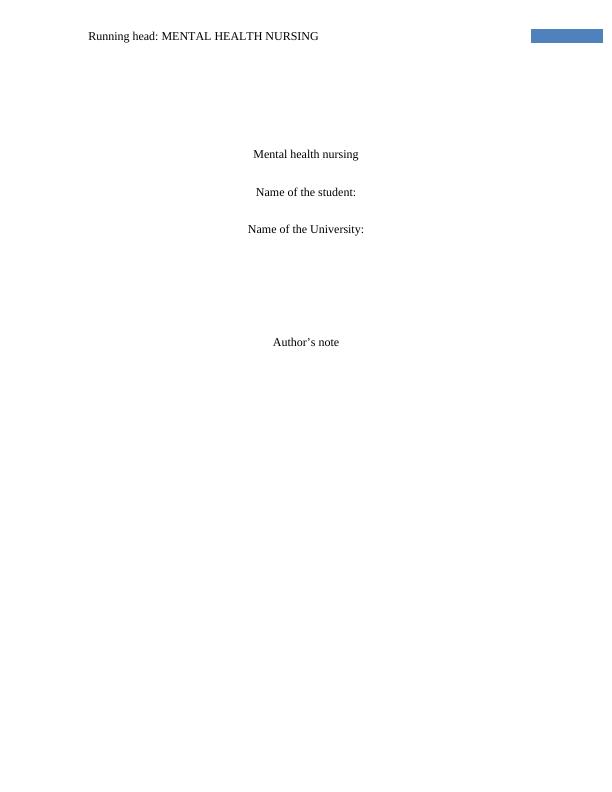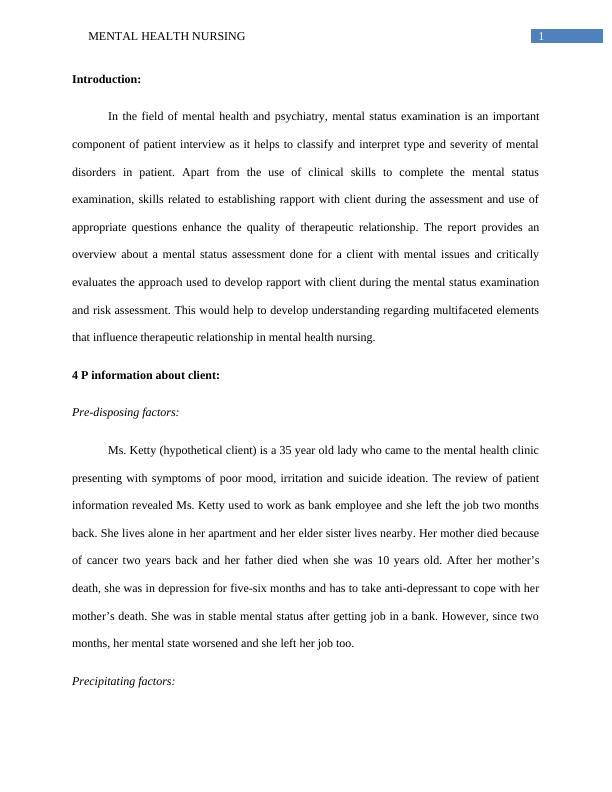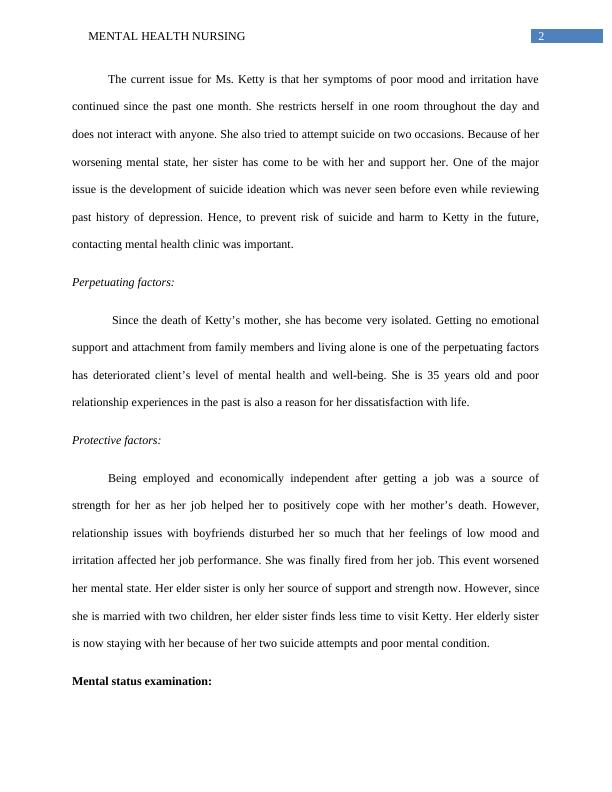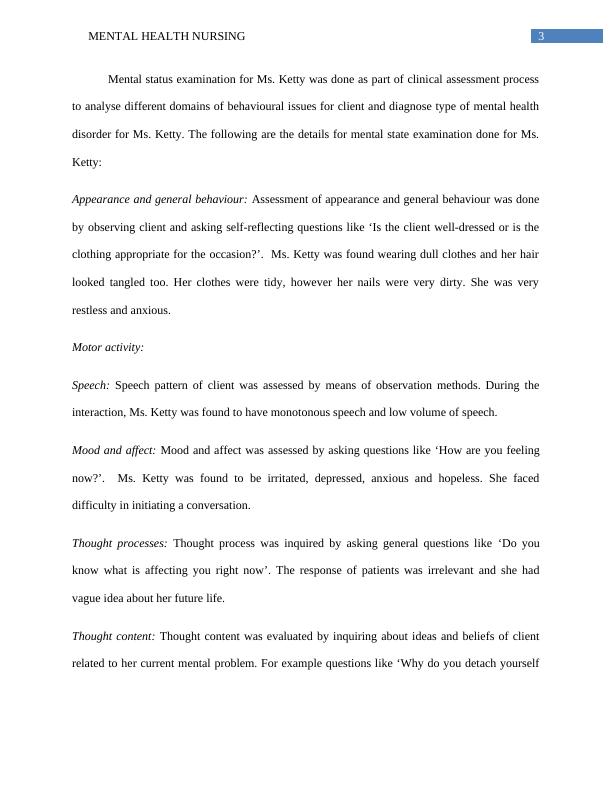Mental Health Nursing: Mental Status Examination and Risk Assessment
Added on 2023-06-08
14 Pages3806 Words282 Views
Running head: MENTAL HEALTH NURSING
Mental health nursing
Name of the student:
Name of the University:
Author’s note
Mental health nursing
Name of the student:
Name of the University:
Author’s note

1MENTAL HEALTH NURSING
Introduction:
In the field of mental health and psychiatry, mental status examination is an important
component of patient interview as it helps to classify and interpret type and severity of mental
disorders in patient. Apart from the use of clinical skills to complete the mental status
examination, skills related to establishing rapport with client during the assessment and use of
appropriate questions enhance the quality of therapeutic relationship. The report provides an
overview about a mental status assessment done for a client with mental issues and critically
evaluates the approach used to develop rapport with client during the mental status examination
and risk assessment. This would help to develop understanding regarding multifaceted elements
that influence therapeutic relationship in mental health nursing.
4 P information about client:
Pre-disposing factors:
Ms. Ketty (hypothetical client) is a 35 year old lady who came to the mental health clinic
presenting with symptoms of poor mood, irritation and suicide ideation. The review of patient
information revealed Ms. Ketty used to work as bank employee and she left the job two months
back. She lives alone in her apartment and her elder sister lives nearby. Her mother died because
of cancer two years back and her father died when she was 10 years old. After her mother’s
death, she was in depression for five-six months and has to take anti-depressant to cope with her
mother’s death. She was in stable mental status after getting job in a bank. However, since two
months, her mental state worsened and she left her job too.
Precipitating factors:
Introduction:
In the field of mental health and psychiatry, mental status examination is an important
component of patient interview as it helps to classify and interpret type and severity of mental
disorders in patient. Apart from the use of clinical skills to complete the mental status
examination, skills related to establishing rapport with client during the assessment and use of
appropriate questions enhance the quality of therapeutic relationship. The report provides an
overview about a mental status assessment done for a client with mental issues and critically
evaluates the approach used to develop rapport with client during the mental status examination
and risk assessment. This would help to develop understanding regarding multifaceted elements
that influence therapeutic relationship in mental health nursing.
4 P information about client:
Pre-disposing factors:
Ms. Ketty (hypothetical client) is a 35 year old lady who came to the mental health clinic
presenting with symptoms of poor mood, irritation and suicide ideation. The review of patient
information revealed Ms. Ketty used to work as bank employee and she left the job two months
back. She lives alone in her apartment and her elder sister lives nearby. Her mother died because
of cancer two years back and her father died when she was 10 years old. After her mother’s
death, she was in depression for five-six months and has to take anti-depressant to cope with her
mother’s death. She was in stable mental status after getting job in a bank. However, since two
months, her mental state worsened and she left her job too.
Precipitating factors:

2MENTAL HEALTH NURSING
The current issue for Ms. Ketty is that her symptoms of poor mood and irritation have
continued since the past one month. She restricts herself in one room throughout the day and
does not interact with anyone. She also tried to attempt suicide on two occasions. Because of her
worsening mental state, her sister has come to be with her and support her. One of the major
issue is the development of suicide ideation which was never seen before even while reviewing
past history of depression. Hence, to prevent risk of suicide and harm to Ketty in the future,
contacting mental health clinic was important.
Perpetuating factors:
Since the death of Ketty’s mother, she has become very isolated. Getting no emotional
support and attachment from family members and living alone is one of the perpetuating factors
has deteriorated client’s level of mental health and well-being. She is 35 years old and poor
relationship experiences in the past is also a reason for her dissatisfaction with life.
Protective factors:
Being employed and economically independent after getting a job was a source of
strength for her as her job helped her to positively cope with her mother’s death. However,
relationship issues with boyfriends disturbed her so much that her feelings of low mood and
irritation affected her job performance. She was finally fired from her job. This event worsened
her mental state. Her elder sister is only her source of support and strength now. However, since
she is married with two children, her elder sister finds less time to visit Ketty. Her elderly sister
is now staying with her because of her two suicide attempts and poor mental condition.
Mental status examination:
The current issue for Ms. Ketty is that her symptoms of poor mood and irritation have
continued since the past one month. She restricts herself in one room throughout the day and
does not interact with anyone. She also tried to attempt suicide on two occasions. Because of her
worsening mental state, her sister has come to be with her and support her. One of the major
issue is the development of suicide ideation which was never seen before even while reviewing
past history of depression. Hence, to prevent risk of suicide and harm to Ketty in the future,
contacting mental health clinic was important.
Perpetuating factors:
Since the death of Ketty’s mother, she has become very isolated. Getting no emotional
support and attachment from family members and living alone is one of the perpetuating factors
has deteriorated client’s level of mental health and well-being. She is 35 years old and poor
relationship experiences in the past is also a reason for her dissatisfaction with life.
Protective factors:
Being employed and economically independent after getting a job was a source of
strength for her as her job helped her to positively cope with her mother’s death. However,
relationship issues with boyfriends disturbed her so much that her feelings of low mood and
irritation affected her job performance. She was finally fired from her job. This event worsened
her mental state. Her elder sister is only her source of support and strength now. However, since
she is married with two children, her elder sister finds less time to visit Ketty. Her elderly sister
is now staying with her because of her two suicide attempts and poor mental condition.
Mental status examination:

3MENTAL HEALTH NURSING
Mental status examination for Ms. Ketty was done as part of clinical assessment process
to analyse different domains of behavioural issues for client and diagnose type of mental health
disorder for Ms. Ketty. The following are the details for mental state examination done for Ms.
Ketty:
Appearance and general behaviour: Assessment of appearance and general behaviour was done
by observing client and asking self-reflecting questions like ‘Is the client well-dressed or is the
clothing appropriate for the occasion?’. Ms. Ketty was found wearing dull clothes and her hair
looked tangled too. Her clothes were tidy, however her nails were very dirty. She was very
restless and anxious.
Motor activity:
Speech: Speech pattern of client was assessed by means of observation methods. During the
interaction, Ms. Ketty was found to have monotonous speech and low volume of speech.
Mood and affect: Mood and affect was assessed by asking questions like ‘How are you feeling
now?’. Ms. Ketty was found to be irritated, depressed, anxious and hopeless. She faced
difficulty in initiating a conversation.
Thought processes: Thought process was inquired by asking general questions like ‘Do you
know what is affecting you right now’. The response of patients was irrelevant and she had
vague idea about her future life.
Thought content: Thought content was evaluated by inquiring about ideas and beliefs of client
related to her current mental problem. For example questions like ‘Why do you detach yourself
Mental status examination for Ms. Ketty was done as part of clinical assessment process
to analyse different domains of behavioural issues for client and diagnose type of mental health
disorder for Ms. Ketty. The following are the details for mental state examination done for Ms.
Ketty:
Appearance and general behaviour: Assessment of appearance and general behaviour was done
by observing client and asking self-reflecting questions like ‘Is the client well-dressed or is the
clothing appropriate for the occasion?’. Ms. Ketty was found wearing dull clothes and her hair
looked tangled too. Her clothes were tidy, however her nails were very dirty. She was very
restless and anxious.
Motor activity:
Speech: Speech pattern of client was assessed by means of observation methods. During the
interaction, Ms. Ketty was found to have monotonous speech and low volume of speech.
Mood and affect: Mood and affect was assessed by asking questions like ‘How are you feeling
now?’. Ms. Ketty was found to be irritated, depressed, anxious and hopeless. She faced
difficulty in initiating a conversation.
Thought processes: Thought process was inquired by asking general questions like ‘Do you
know what is affecting you right now’. The response of patients was irrelevant and she had
vague idea about her future life.
Thought content: Thought content was evaluated by inquiring about ideas and beliefs of client
related to her current mental problem. For example questions like ‘Why do you detach yourself

End of preview
Want to access all the pages? Upload your documents or become a member.
Related Documents
Mental Health Trauma And Recovery Case Study 2022lg...
|9
|1952
|14
Mental Health Nursing Case Study 2022lg...
|28
|8010
|22
Recovery Focused Mental Health Care Planlg...
|14
|2750
|18
Nursing Care Plan | Case Studylg...
|14
|2157
|46
Understanding Depression: A Case Study of Ms Jessica and the Role of Nurses in Public Health Promotionlg...
|14
|5031
|405
International Journal of Mental Health Systemslg...
|4
|457
|21